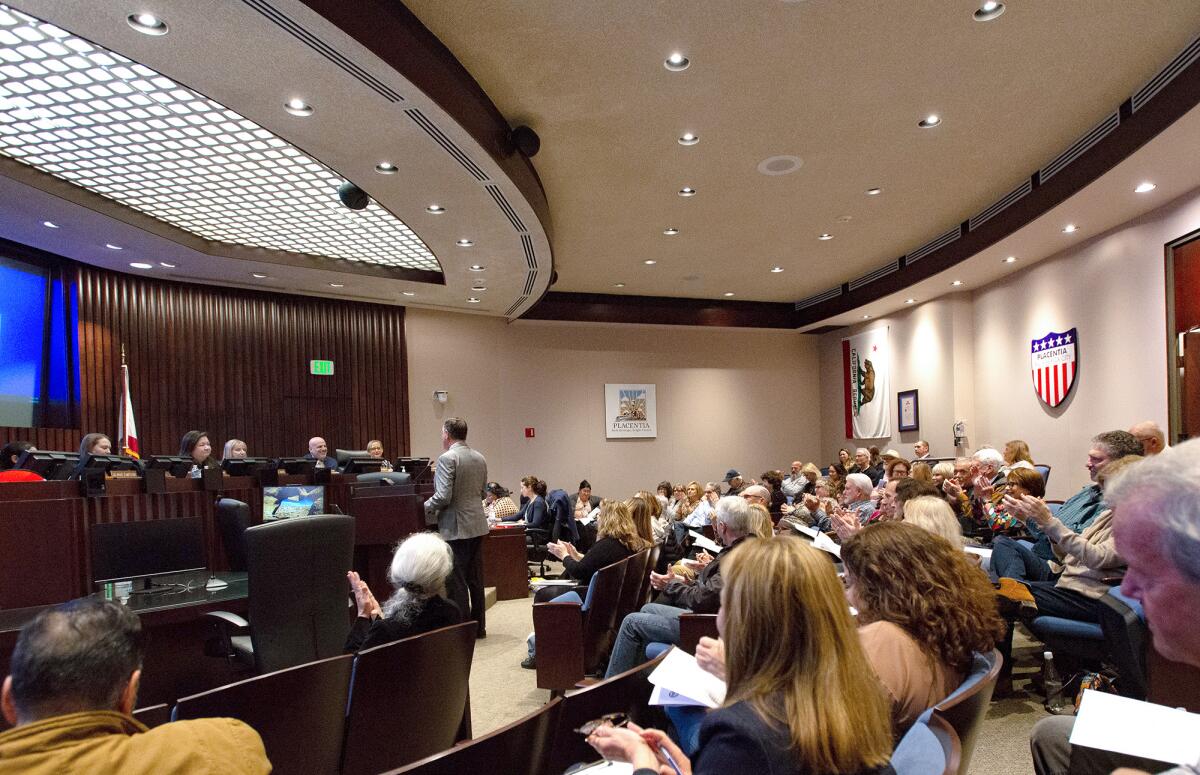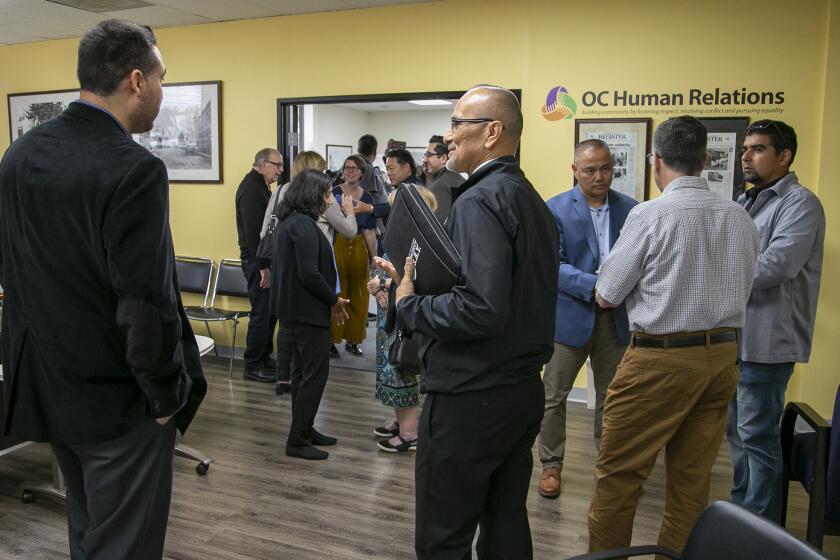Supervisors shrink O.C. Human Relations Commission in revamp

- Share via
The Orange County Board of Supervisors voted to overhaul a county commission tasked with tackling discrimination and issuing annual hate crime reports.
During Tuesday’s board meeting, a majority of supervisors cited a need to reorganize the Orange County Human Relations Commission in downsizing it to seven members, five of whom would continue to be directly appointed by supervisors.
Chairman Don Wagner referred to the previous 11-member board as “large and unwieldy.”
At the same time, supervisors increased the number of law enforcement positions on the commission to two, with a representative of the Orange County Sheriff’s Department set to be seated in addition to an at-large police commissioner.
Supervisor Vicente Sarmiento opposed the overhaul on several grounds.
“We’re heading down the wrong path,” he said. “It’s clearly a moment that we should be leaning into something like this, rather than retracting and confining it, and making it much, much more limited than it once was.”
The lack of collaboration with community-based organizations and a sole reliance on law enforcement data are chief criticisms of the recently released O.C. Human Relations Commission hate crime report.
The shakeup comes on the heels of the commission quietly issuing its 2023 Orange County Hate Crime Report, which charted a 52% decrease in overall reported hate crimes from the previous report.
It was the first such decrease charted in several years, though the report urged “caution” as four local police departments submitted partial data.
Groundswell, a nonprofit previously known as Orange County Human Relations, began compiling data for the 2023 report, but supervisors elected not to renew its contract in June.
In key departures, the 2023 report relied on law enforcement data only, did not collaborate with community-based organizations and did not include hate “incident” statistics on bias-motivated conduct that wasn’t otherwise prosecutable.
At Tuesday’s meeting, Supervisor Katrina Foley stressed the need to revamp how future hate crime reports are compiled.
Foley aired concerns about a lack of a uniform standard on hate incident data, duplicate reporting and other forms of inflated data, including counting the number of attendees at a hate event each as an individual hate incident.
“If we’re going to include hate incidents in a hate crimes report, which I believe we should, we need to create a methodology that is credible,” she said. “That is something I would expect this the new purposed commission to be charged with developing at the outset.”
The 2023 report also appeared to revise historical data, dropping the number of reported hate crimes in 2022 from 162 to 112.
A county spokesperson deferred TimesOC questions about the discrepancy to Groundswell.
Alison Edwards, chief executive of Groundswell, noted that underreporting is always a key issue in trying to identify hate trends but stood by past reports her nonprofit helped produce.
“We were consistent year over year in working with our partners,” she said. “With the help of law enforcement agencies, community organizations and our own work to cross reference and take away duplicates, past reports produced great trend data to try to see if hate activity was, broadly, on the increase or decrease in county.”
The Council of American-Islamic Relations’ local chapter, which partnered with Groundswell on past hate crime reports, agreed that hate incidents should be vetted before being included in the data in noting that its classification of hate incidents aligns with the California Civil Rights Department.
“CAIR-LA would not count the number of attendees at a rally as multiple hate incidents, nor should other organizations,” said Amr Shabaik, CAIR-LA’s legal director.
Supervisors voted to replace support staff for the O.C. Human Relations Commission with county employees during discussions of the county’s budget.
In addition to shrinking the commission’s size, supervisors also decided to cut commission meetings down from monthly to quarterly.
Other changes include a ban on statements or press releases issued by the commission.
After the Israel-Gaza war erupted, the commission released a pair of statements against antisemitism and Islamophobia.
Pro-Palestinian activists packed commission meetings to demand two commissioners who voted against the Islamophobia statements be removed.
Jewish organizations called criticisms of Commissioner Rabbi Rick Steinberg “antisemitic” during the fray.
With the commission now downsized, the local Arab-Muslim community lost its only commissioner, Reina Obeid, who was appointed by a committee process scrapped in the overhaul.
The changes have concerned CAIR-LA.
“Those tasked with selecting commissioners must ensure that the commission is reflective of the diverse community of Orange County,” said Shabaik, “especially those who have been historically marginalized, such as the significant Arab-Muslim population.”
So far, bringing the commission’s work in-house has fallen on the shoulders of one county staffer in the chief executive’s office.
Foley acknowledged that the 2024 hate crime report for the county is already behind schedule.
“We need to create a plan [that] the commission needs to look at,” she said. “If we have gaps in terms of representation, I would be open to increasing the representation, but I feel like we need to get it organized first.”
All the latest on Orange County from Orange County.
Get our free TimesOC newsletter.
You may occasionally receive promotional content from the Daily Pilot.






